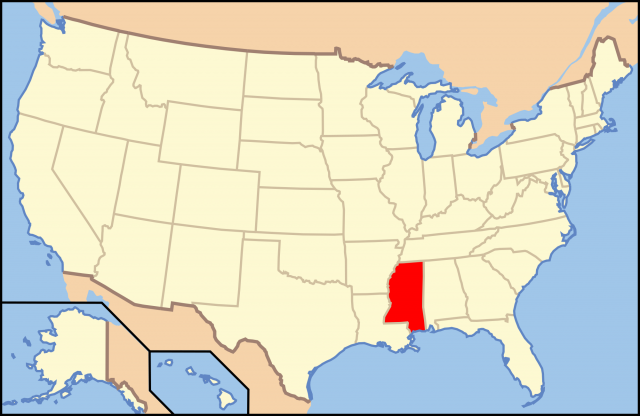The State of Mississippi
AT A GLANCE
Name: Mississippi comes from a Native American word that means “father of waters.”
Nickname: Magnolia State
Capital: Jackson
Size: 47.695 sq. mi. (123,530 sq km)
Population: 2,992,333 (2015 est)
Statehood: Mississippi became the 20th state on December 10, 1817.
Electoral votes: 6 (2016)
State representatives: 5 (until 2016)
State tree: magnolia
State flower: magnolia
State fish: black bass
Highest point: Woodall Mountain, 806 ft. (246 m)

THE PLACE
Mississippi is located in the Deep South and was named after the Mississippi River, which forms most of its western border. Part of the Mississippi River Delta, the triangular area around the mouth of the river, forms the western corner of the state. The Mississippi has also left behind many oxbow (crescentshaped) lakes that were once curves in the river.
The rest of the state is covered with gently rolling hills, forests, and prairies. The Black Belt, so named for the deep color of its soil, is in northeastern Mississippi. The Gulf of Mexico, with its sandy beaches, forms Mississippi's southern border.
Many different crops grow well in Mississippi because of its warm, humid climate. Summers are long and cooled by winds from the Gulf of Mexico, and winters are short and mild. Hurricanes sometimes occur in late summer and early fall.
Facts and Firsts
- The rarest kind of North American crane, the Mississippi sandhill crane, is found only in the grassy savannas of Jackson County. This four-foot-tall bird has a six-foot wingspan.
- In 1834, Captain Isaac Ross founded the African country of Liberia when he freed all the slaves on his Lorman plantation and paid for their transportation back to Africa.
- During the Civil War, more people from Mississippi died than from any other state. Of the 78,000 Mississippians that fought in the Confederate army, more than 59,000 were wounded or killed in battle.
- The world's first human lung and heart transplants were performed at the University of Mississippi in 1963 and 1964.
THE PAST
Spanish explorer Hernando de Soto first sailed down the Mississippi River in 1541 and found members of the Chickasaw, Choctaw, and Natchez Native American tribes living in the Mississippi region. He did not find gold as he had hoped, so he left the area and did not establish any settlements there.
Later, French colonists from Canada became the first white settlers in Mississippi. They brought in the first slaves from Africa in 1719 to work in their rice and tobacco fields. The French lost the region to England after the British helped the Native Americans take back control of their land during the French and Indian War. After the American Revolution, the British surrendered the area to the United States, and Mississippi became a state in 1817.
By 1832, most of the Native Americans had been forcibly removed to Oklahoma Territory, and settlers moved west into the region to farm the newly available land. Cotton plantations quickly were built all over the state. During the Civil War, Mississippi residents fought on the Southern side to maintain their right to use slave labor on their vast plantations.
After the Civil War, the loss of revenue from cotton caused the economy to suffer, but the construction of railroads provided access to the state's pine forests, and lumbering became an important industry. During World War II, the shipbuilding industry prospered.
Agriculture grew until the 1960s, when machines began to replace human labor on farms. During the latter half of the 20th century, Mississippi worked to attract new industries that would employ many of the workers no longer needed on farms. During the 1980s and 1990s, unemployment rose and low-income households increased in number.
THE PRESENT
Mississippi suffers from high unemployment rates and low wages. During the last two decades, Mississippi has had one of the lowest average family incomes of any state. The state has attempted to attract new industries in an effort to improve its economy. A leading producer of chickens and cotton, Mississippi also produces petroleum and meat. Manufactured goods include chemicals, wood products, ships, and machinery such as engines and farm equipment.
Cities along the Mississippi River are important trade and business centers. Many telecommunications and financial services companies have offices in river cities, including Jackson. Stennis Space Center in Hancock is a rocket-testing site for the National Aeronautics and Space Administration (NASA).
Mississippi's Gulf Coast, with its white beaches, is a popular tourist destination, and tourism provides a significant source of revenue. Casino gaming has also become a profitable industry in the state.
Born in Mississippi
- Jimmy Buffett, singer and songwriter
- Bo Diddley, musician
- William Faulkner, author
- Morgan Freeman, actor
- Jim Henson, puppeteer
- James Earl Jones, actor
- B.B. King, musician
- Willie Morris, author
- Elvis Presley, singer and actor
- Jerry Rice, football player
- LeAnn Rimes, singer
- Sela Ward, actress
- Eudora Welty, author
- Tennessee Williams, playwright
- Oprah Winfrey, talk show host and actress